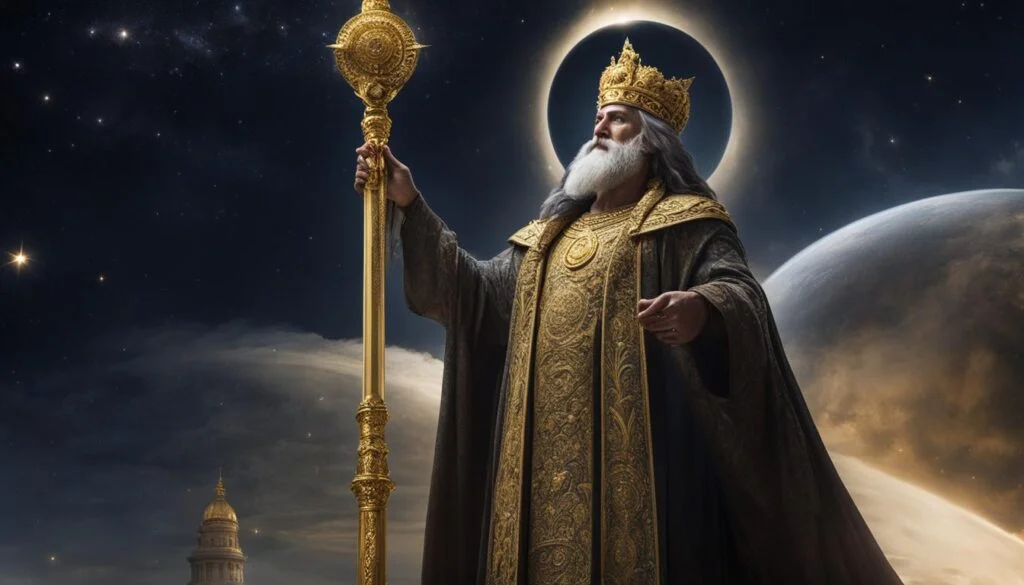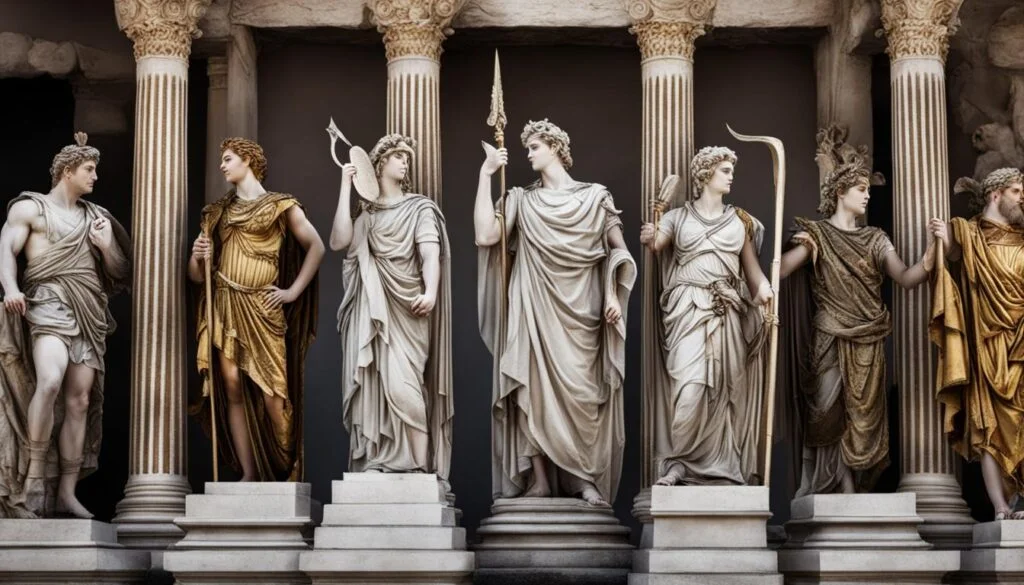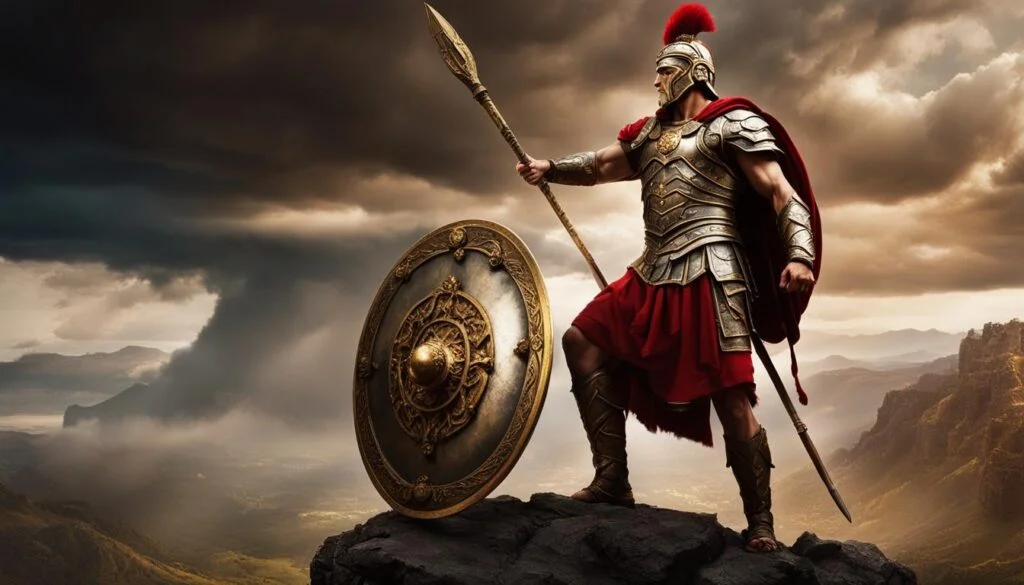Welcome to our deep dive into the fascinating world of Roman mythology, where we unravel the mysteries surrounding the god Saturn. In this article, we’ll explore the role of Saturn in Roman religion, his significance as the ruler of the Golden Age, and his portrayal as the god of harvest. Join us on this captivating journey as we uncover the legends and symbolism associated with Saturn in Roman mythology.
Key Takeaways:
- Saturn played a significant role as the father of Jupiter and the ruler of the Golden Age in Roman mythology.
- He was considered the god of agriculture and harvest, representing peace, abundance, and prosperity.
- Greek mythology heavily influenced Roman myths, with Saturn identified as the Roman equivalent of the Greek god Cronus.
- Saturn held a prominent position in Roman religion, with his worship being an integral part of religious practices and ceremonies.
- Depictions of Saturn in art and literature reflect his enduring significance in Roman culture.
The Influence of Greek Mythology on Roman Myths
Greek mythology had a significant impact on the development of Roman myths and legends. As the Roman Empire expanded its influence into Greece, the Romans absorbed and assimilated many elements of Greek culture, including their myths. This cultural exchange resulted in the merging and adaptation of Greek and Roman mythology, forming a rich tapestry of divine tales that intertwined the gods and stories of both civilizations.
In the case of Saturn, the Roman god associated with agriculture and harvest, he is identified as the equivalent of the Greek god Cronus. In Greek mythology, Cronus was known as the father of the Olympian gods, and this association carried over to Saturn in Roman mythology. The assimilation of the Greek and Roman pantheons resulted in similarities and adaptations in the stories and roles of the gods, further blurring the lines between the two mythological traditions.
The influence of Greek mythology on Roman myths can be seen in the artistic depictions and literary works of the time. Artists often portrayed Saturn with a scythe or sickle, much like Cronus, symbolizing his role as the god of harvest. Writers and poets also explored the mythological significance of Saturn, incorporating elements of Greek mythology into their works. The merging of the two mythological traditions enriched the storytelling and added depth to the characters and narratives.
The Role of Saturn in Roman Religion
In Roman religion, Saturn held a prominent position as one of the major gods. He was associated with agriculture, fertility, and abundance, and his worship was an integral part of religious practices and ceremonies in ancient Rome. Saturnalia, a festival held in December, was dedicated to Saturn and was characterized by feasting, gift-giving, and a temporary reversal of social roles. The festival symbolized Saturn’s role as the god of harvest and the renewal of life during the winter season. Saturn’s importance in Roman religion showcases his significance in the mythological and cultural beliefs of ancient Romans.
The Festival of Saturnalia
One of the most important celebrations in Roman religion was the festival of Saturnalia, which honored Saturn. This festival, held in December, was a time of joy and merriment, with feasting, gift exchanges, and the suspension of social norms. During Saturnalia, slaves were temporarily freed, and masters served their servants. This reversal of roles symbolized the equality and abundance that Saturn brought to the world. The festival was a time of celebration and thanksgiving for the bountiful harvests and prosperity that Saturn’s influence brought.
Saturn’s Symbolism and Worship
As the god of agriculture, Saturn was often depicted with a sickle or scythe, representing the harvest and the cyclic nature of life. His worship involved rituals and offerings to ensure a good harvest and the continued fertility of the land. Saturn’s influence extended beyond agriculture and was associated with the prosperity and well-being of the Roman people. His importance in Roman religion is evident in the numerous temples and altars dedicated to him throughout the empire, highlighting the reverence and devotion the Romans had towards Saturn.
The role of Saturn in Roman religion illustrates the deep connection between mythology, culture, and religious beliefs in ancient Rome. As the god of agriculture and abundance, Saturn played a crucial role in ensuring the prosperity and well-being of the Roman people. His worship and festivals, such as Saturnalia, were integral parts of religious practices and reflected the importance placed on honoring and appeasing the gods. The legacy of Saturn in Roman religion continues to resonate, reminding us of the significant role mythological figures played in shaping the beliefs and values of ancient civilizations.
Saturn, the God of Harvest in Roman Mythology
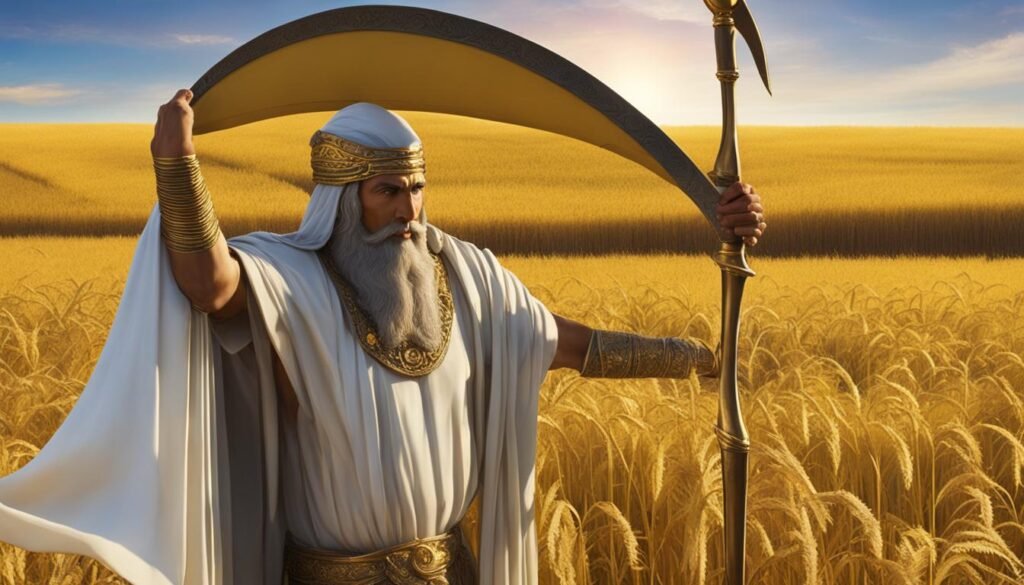
In Roman mythology, Saturn was not only a revered deity but also held a significant role as the god of harvest and agricultural abundance. The ancient Romans believed that Saturn taught humanity the art of farming and blessed them with knowledge of sowing and reaping. As the god of harvest, Saturn symbolized the cycle of life and death, depicted with a sickle or scythe in hand.
Worship of Saturn during harvest seasons was a vital ritual for the Roman people. They relied on successful harvests for their livelihoods, and Saturn’s intervention and blessings were sought to ensure bountiful crops and a prosperous agricultural year. The importance of Saturn as the god of harvest highlights the significance of agriculture in Roman society and the essential role it played in sustaining the population.
During festivals and ceremonies dedicated to Saturn, the Roman people expressed their gratitude for a fruitful harvest and celebrated the abundance he provided. These festivities were characterized by feasting and merriment, reflecting the joy and gratitude felt by the Roman populace for Saturn’s benevolence. The worship of Saturn demonstrated the deep connection between the Roman people and the land, emphasizing their reliance on nature’s bounty for sustenance and prosperity.
Saturn, the Ruler of the Golden Age
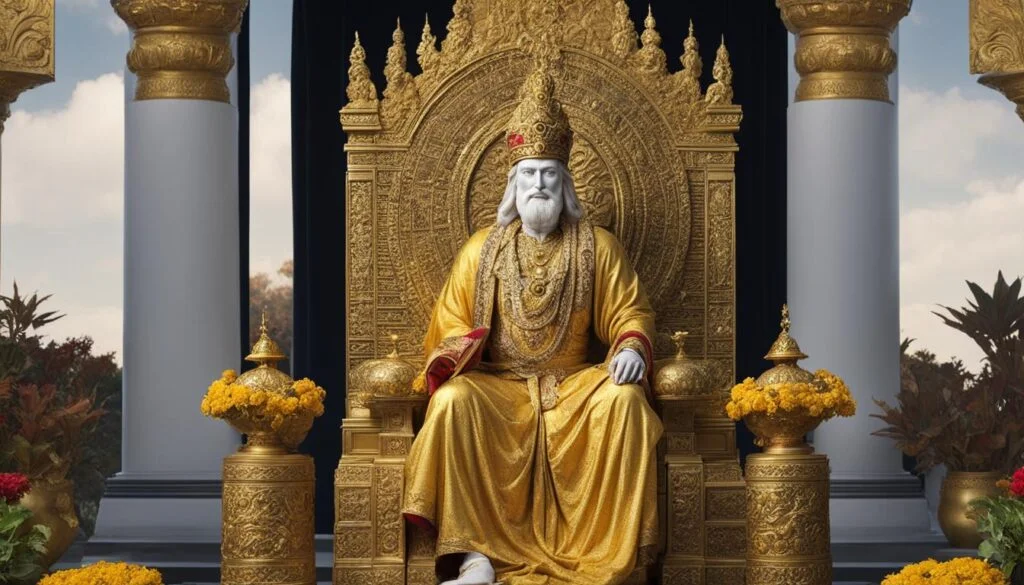
In Roman mythology, Saturn held a significant role as the ruler of the Golden Age. This was a time of harmony, peace, and prosperity, where humans lived in perfect balance with nature. Saturn’s reign symbolized an idealized past characterized by abundance and happiness. The concept of the Golden Age had a profound influence on Roman society and was often used as a symbol of an ideal society to strive for.
In Roman religion, Saturn’s role as the ruler of the Golden Age was celebrated and revered. His worship and festivals, such as Saturnalia, honored his influence and represented the renewal of life during the winter season. Saturnalia was a time of feasting, gift-giving, and the temporary reversal of social roles, further emphasizing the ideals of the Golden Age. Saturn’s depiction as a benevolent ruler in Roman mythology elevated his status and significance in the religious and cultural beliefs of ancient Romans.
The Symbolism of the Golden Age
- The Golden Age represented a time of peace, abundance, and harmony.
- Humans lived in perfect balance with nature.
- The ideals of the Golden Age influenced Roman society and religious practices.
- Saturn’s role as the ruler of the Golden Age was celebrated in festivals like Saturnalia.
Throughout history, Saturn’s role as the ruler of the Golden Age has been depicted in various art forms and literature. Artists have captured the essence of the Golden Age in their works, portraying a utopian society where all is well. Writers and poets have also explored the symbolism of the Golden Age, using it as a metaphor for an idealized past or a future to aspire to. The legacy of Saturn as the ruler of the Golden Age continues to inspire and captivate the imagination of artists and audiences alike.
The symbolism of the Golden Age and Saturn’s role as its ruler highlight the aspirations of ancient Romans for a peaceful and prosperous society. Understanding Saturn’s significance in Roman mythology provides insights into the values and beliefs of the time, offering a glimpse into the cultural and religious practices of ancient Rome.
The Legacy of Saturn in Roman Mythology
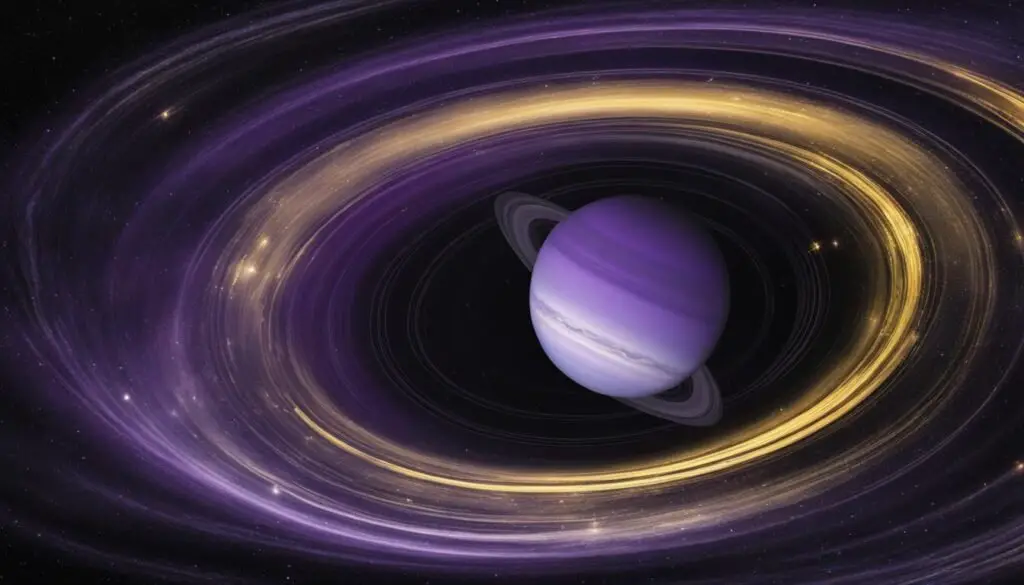
Saturn, the Roman god of agriculture, harvest, and the Golden Age, left an indelible mark on Roman mythology and continues to be revered to this day. His mythological significance can be traced back to the merging of Greek and Etruscan influences on Roman culture, resulting in a unique portrayal of this divine figure.
The Role of Saturn in Roman Religion
Saturn held a prominent position in Roman religion, where he was worshipped as one of the major gods. His association with agriculture and fertility made him a vital deity in the lives of the ancient Romans, as their livelihoods relied on successful harvests. The festival of Saturnalia, held in December, was a testament to his importance, characterized by feasting, gift-giving, and a temporary overturning of social roles.
Saturn, the God of Harvest
Saturn’s role as the god of harvest cemented his significance in Roman mythology. Believed to have taught humans the art of farming, he provided them with the knowledge of sowing and reaping. Depicted with a sickle or scythe, he symbolized the cycle of life and death inherent in nature, reminding the Romans of the interconnectedness of all things.
Depictions of Saturn in Art and Literature
Throughout history, Saturn’s story and symbolism have been depicted in various art forms, from sculptures to paintings. Artists often portrayed him with his trademark sickle, emphasizing his role as the god of harvest. Writers, too, found inspiration in Saturn’s mythological significance, weaving his character into their literary works and poetry. These artistic representations offer us a glimpse into the enduring impact of Saturn’s story on Roman culture and the fascination it continues to evoke.
The legacy of Saturn in Roman mythology is a testament to the profound influence of ancient beliefs and the enduring fascination with the gods and goddesses of the past. From his role as the father of Jupiter to his association with agriculture, fertility, and the Golden Age, Saturn’s story continues to captivate and inspire those interested in the rich tapestry of Roman mythology.
Depictions of Saturn in Art and Literature
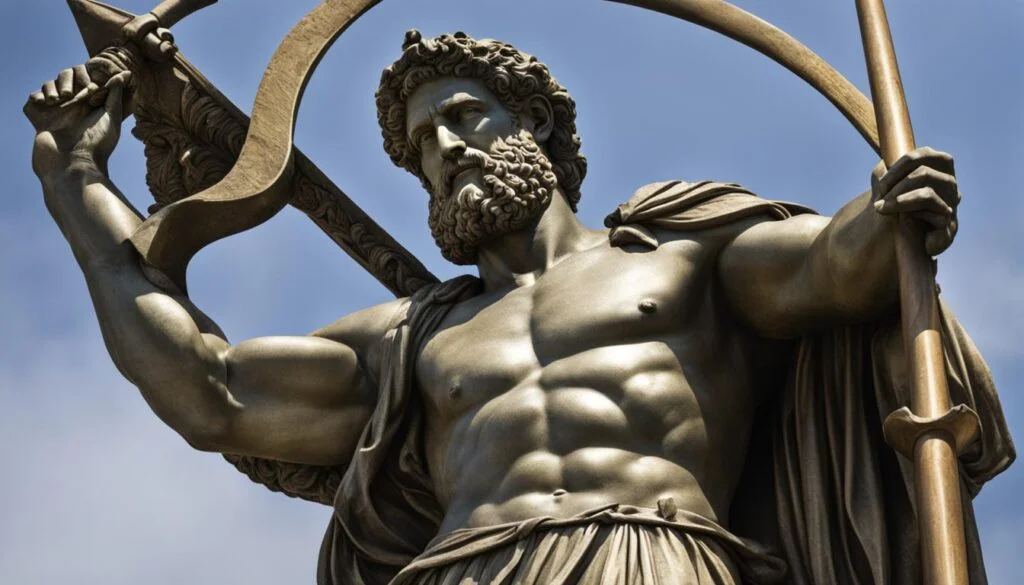
Saturn’s mythological significance and captivating story have inspired artists and writers throughout history, resulting in various depictions of this Roman deity in art and literature. These creative works offer further insights into Saturn’s role in Roman mythology and the enduring impact of his story.
In Roman art, Saturn is often depicted holding a scythe or sickle, symbols representing his role as the god of harvest. These visual representations highlight his importance in agricultural abundance and the cyclical nature of life. Artists skillfully captured Saturn’s mythological attributes and used their talents to bring his character to life.
Writers and poets have also been influenced by Saturn’s story, incorporating his mythological significance into their literary works. From epic poems to plays, Saturn’s role in Roman mythology has served as a source of inspiration, resulting in rich and engaging narratives that explore the complexities of ancient Roman beliefs and values.
Artistic and Literary Interpretations
- Paintings: Artists have created stunning paintings depicting Saturn, showcasing his connection to agriculture and the natural world.
- Sculptures: Intricate sculptures have been crafted to capture Saturn’s mythical presence, often emphasizing his association with time and the harvest.
- Poetry: Poets have written verses that delve into Saturn’s role as a god of abundance and prosperity, exploring themes of renewal and the ideal society.
- Dramatic Works: Playwrights have incorporated Saturn’s character and mythology into their plays, weaving his story into compelling narratives.
These artistic and literary interpretations of Saturn not only demonstrate the enduring appeal of Roman mythology but also provide a glimpse into the cultural and societal significance of this ancient deity. Through their creativity, artists and writers have preserved and celebrated Saturn’s role in Roman religion and mythology, ensuring his legacy lives on.
Conclusion
The mythological figure of Saturn played a significant role in Roman mythology and religion. As the father of Jupiter and the ruler of the Golden Age, Saturn held a prominent position as a god of harvest, agriculture, and prosperity. His story and symbolism have shaped the beliefs and values of ancient Romans, leaving a lasting legacy in their culture.
The merging of Greek and Etruscan influences on Roman mythology resulted in Saturn’s identification as the Roman equivalent of the Greek god Cronus. This fusion of myths created similarities and adaptations in the divine tales, further enriching Saturn’s character and mythology.
Depictions of Saturn in art and literature have flourished throughout history, showcasing his enduring significance in Roman culture. From his representation with a scythe or sickle in Roman art to the inspiration he provides for writers and poets, Saturn’s mythology continues to captivate and inspire audiences.
Exploring what Saturn did in Roman mythology deepens our understanding of ancient Roman beliefs and their influence on subsequent cultures. By delving into Saturn’s roles as the god of harvest, the ruler of the Golden Age, and the father of Jupiter, we gain insight into the complex and rich tapestry of Roman mythological and religious traditions.
FAQ
What was Saturn’s role in Roman mythology?
Saturn was considered the father of Jupiter and the ruler of the Golden Age. He was the god of agriculture and harvest and associated with time.
How did Greek mythology influence Roman myths?
Greek mythology had a significant impact on Roman myths, and Saturn is identified as the Roman equivalent of the Greek god Cronus.
Why was Saturn important in Roman religion?
Saturn held a prominent position as one of the major gods in Roman religion. He was associated with agriculture, fertility, and abundance.
Why was Saturn worshipped during harvest seasons?
Saturn was revered as the god of harvest and agricultural abundance. His worship during harvest seasons was an important ritual in Roman society.
What was the Golden Age in Roman mythology?
The Golden Age was a period of peace, abundance, and harmony in Roman mythology. Saturn’s reign represented an idealized past and an ideal society.
How has Saturn’s story influenced Roman culture?
Saturn’s association with agriculture, harvest, and the Golden Age shaped the beliefs and values of ancient Romans. His mythology continues to captivate and inspire.
How has Saturn been depicted in art and literature?
Saturn is often portrayed with a scythe or sickle in Roman art, symbolizing his role as the god of harvest. Artists and writers have explored his mythological significance in various works.


